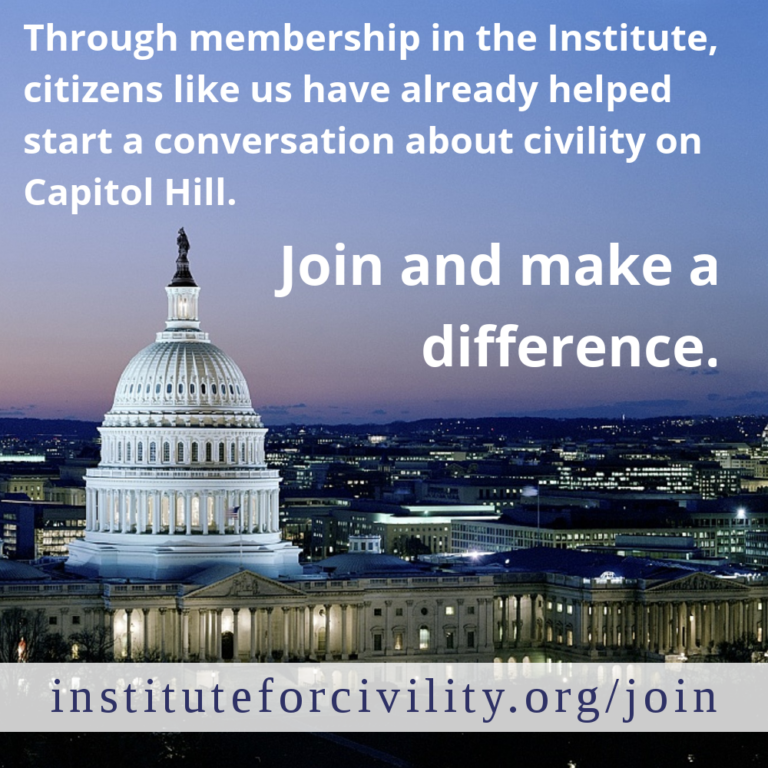Civility Linkblogging: high school, history, and Hakarat Hatov

This post is part of an ongoing series that highlights discourse about civility from around the Web. We glean the links in this segment from as broad a cross-section as we can manage of blogs, newspapers, magazines, and other online venues, from the United States and around the world.
This week’s links feature two pieces that are particularly notable. The first is an article by J. Patrick Coolican that should remind us, in slightly irreverent terms, that while working toward civility is important, incivility is not a new problem in the United States. It is as old as Thomas Jefferson and John Adams, as old as Senator Charles Sumner being beaten on the floor of the Senate by Representative Preston Brooks. And acting as though it is a product of 21st century gridlock is disingenuous.
The second notable piece is in The Times of Israel. There, Rabbi Arnold Samlan makes the simple and powerful observation that we can learn civility — perhaps best — from the people with whom we most vehemently disagree. He tells us that simply recognizing when another human being has done something good for you should provide us enough common ground to cross political lines.
If you have an article that you think would be right for future civility linkblogging posts, please do not hesitate to email it to us at [email protected]. Include the title, url, and a short summary, and we will gladly review it for publication.
Now — the list:
Is Civility a Lost Art?
Posted by Lynne Agress at The Baltimore Sun, March 12, 2015
When we live among others, we must be aware of them. Too many individuals think the world revolves only around them.
“Be agreeable,” says Professor Forni. Benjamin Franklin put it even better: “If you [want to] be loved, [then] love and be lovable,” which is, of course, a rephrasing from the Bible: “do unto others as you would have them do unto you.”
Celebrating Civility
Posted at U-T San Diego, March 21, 2015
Excerpts from Celebrating Civility Awards high-school essay contest finalists.
I see civility as respect for others and their opinions, acknowledging differences in each other and valuing them for the diversity that they bring, not the divisions they can create. To me, open-mindedness is a key part of civility, because politeness is not polite when only applied to the people who agree with you most. True respect is shown when you can give weight and value to a different perspective.
I think that my generation is better at this than any that came before us. We are more open-minded and accepting than our parents and grandparents. We see the divisions of race and gender and religion less starkly than those that came before us.
What We Can Learn From Patrick Henry’s ‘Give Me Liberty or Give Me Death’ Speech
Posted by Carson Holloway at The Daily Signal, March 23, 2015
First, the speech reminds us of the importance of both civility and candor to a healthy politics. Perhaps surprisingly in view of its impassioned ending, the speech begins by noting the importance of civility. Henry opens his remarks by acknowledging the “patriotism, as well as the abilities” of those who spoke on the other side of the issue. He disclaims any intention to be “disrespectful” to them.
Nevertheless, the speech also points to the need for a candid civility. The stakes in play—freedom or slavery—require each citizen to speak his mind forthrightly. Only on the basis of such open debate, after all, can we “hope to arrive at truth, and fulfill the great responsibility we hold to God and our country.” Civility means not seeking to give offense. It does not mean avoiding hard truths because they may offend others.
Sarcasm in Politics? Whatever.
Posted by J. Patrick Coolican at StarTribune.com, March 28, 2015
Now come the civility finger-waggers. The news release says a team of policy fellows from the Humphrey School is launching “Keep It Civil MN.” …
The fever swamps of the Internet have certainly produced a vile stream of noxious rhetoric catalyzed by what’s been termed the “online disinhibition effect,” though the simple solution is to look away from the digital morass.
Because the stakes of the political process are often great — the role of government, war and peace, the rights of the individual vs. the state — these democratic debates arouse passion and sometimes even rancor. It has always been thus.
Lessons on Civility, Israeli Elections and President Obama from a Bad Food Experience
Posted by Arnold D. Samlan at The Times of Israel, March 29, 2015
And there you have it. Hakarat Hatov, the incredibly Jewish value of recognizing when another human being has done something good for you. And kavod, honoring the image of God, wherever you find it. And I apologize to you, my new friend. Because even though your opinions and mine do not align, you have taught me an object lesson in kavod haberiot, respect for God’s creatures. And you reminded me that, even though our opinions might be different, I should never believe for a moment that I don’t have something to learn from you. Because now that I have learned from you, you are my teacher and therefore are always to be treated with respect.

